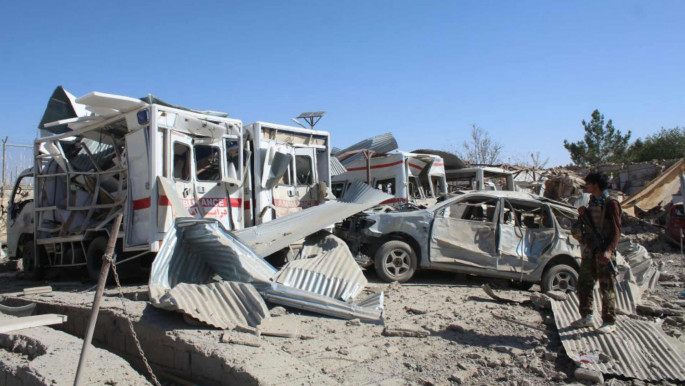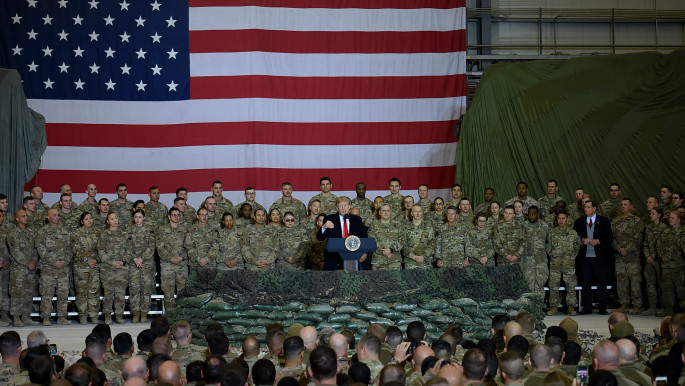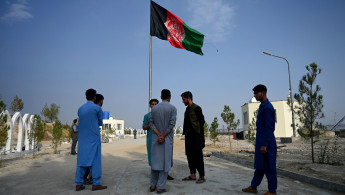Post-presidential election and a peace plan: What is next for Afghanistan?
A couple of days prior to the US Secretary of State, Mike Pompeo's announcement, the Afghanistan Independent Election Commission (IEC) declared incumbent Ashraf Ghani as the winner of the presidential elections that were held in late September last year, but marred by widespread fraud and irregularities.
The preliminary result of the election announced by the IEC gave a slight edge of 12,000 votes to Ashraf Ghani over his rivals, a decision which was met with fraud and electoral irregularities allegations by other presidential candidates.
"In an area where there is low literacy, these results are simply impossible. One can attack me as much as they like, but I merely want free and fair elections," said professor Thomas Johnson, who served as the Senior Political and Counterinsurgency Adviser to Commander of Canadian Forces in Afghanistan (Task Force Kandahar) in 2009.
"Many Afghans who risked their lives to vote had their votes tossed. That's the reality and it disturbs me greatly. I guess the Ghani admin is unable to deal with an objective election."
 |
Many Afghans who risked their lives to vote had their votes tossed |  |
 |
|
| Read also: How Taliban interference is hijacking Afghanistan's election |
The final result was supposed to be announced after the Independent Electoral Complaints Commission (ECC) invalidated the votes based on documented fraud cases registered by the presidential candidates.
More than 16,000 complaints were filed to the Afghan election authorities in December over the handling of the presidential polls. The IEC said that the final results would then be announced in the coming weeks after the complaints have been reviewed.
"(Officials) have 15 days to finalise its investigation into the complaints and release the results to the candidates," said Zuhra Bayan Shinwari, head of the Independent Electoral Complaints Commission (ECC).
However, it took the IEC almost three months to announce the final result, that too at a critical moment when the US-Taliban peace talks were at the final stages. But the announcement of the final result took many by surprise.
"It was a surprise for me, I saw it on the television," said Younus Tughra, a member of the ECC. "The members of the election commission were sitting together to announce the election results while we were not aware of it."
Ahmad Wali Massoud, a presidential candidate, added, "I am confident that the Afghan people will never forgive the work of the commission, nor will the results be acceptable to the people of Afghanistan."
The Transparent Election Foundation of Afghanistan (TEFA) called the IEC's announcement of the final results as "hasty and a poorly thought-out decision, owing to irregularities and incomplete status of the process of carrying out ECC's resolutions".
TEFA claimed that their findings reveal that "almost 20 percent of ECC's resolutions (Audit and Recount) in a certain number of provinces have remained incomplete, and IEC's special audit took place during night time when ECC's, domestic and international groups' observers were not present".
The world is slow to react
 |
|
| Will the US-Taliban negotiations settle Afghanistan's political problem? |
After almost more than 24 hours, no international reaction was recorded on the result of the presidential election and very few countries sent their congratulatory and support messages for the next government headed by President Ashraf Ghani.
"I don't have anything to say about #Afghanistan, other than we've been following the election results, very very closely, we want to make sure that we've got it, got it exactly right," said Pompeo on the re-election of President Ashraf Ghani.
But the Taliban said the announcement of Ashraf Ghani as president "has no legal basis" and "under the cover of fake elections is unlawful", adding that the election was a process to select a "puppet government" by the US government.
 |
The Taliban said the election was a process to select a 'puppet government' by the US government |  |
An 'all-inclusive government'
Twitter Post
|
After the announcement of the election result, Chief Executive of the National Unity government, Dr Abdullah Abdullah, declared himself as the legitimate winner based on "clean votes" and vowed to form an "all-inclusive government".
Read also: Afghan election candidate loses and announces his own 'government'
"There is no doubt that we are the winners of the elections based on transparent and biometric votes. The decision on disputed votes was illegal and amounts to a coup and national treason in favour of our rival team," he stated.
After the announcement of his "all-inclusive government," Dr Abdullah Abdullah barred the leadership of IEC from leaving Afghanistan, owing to the claims of fraud and favouritism they committed.
The promise of an "all-inclusive government" was welcomed by most candidates, as well as former president, Hamid Karzai.
Dr Abdullah Abdullah appointed the very first governor of his "all-inclusive government" for the Sari-Pul province, a decision that "extremely concerned" the United Nations Assistance Mission in Afghanistan.
This comes at a time when the US is on the verge of leaving Afghanistan after a peace deal is to be signed with the Taliban.
The Taliban claimed they have control or influence over more than 50 percent of Afghanistan's territory, while the rest of the territory will be shared by the presidential palace and the newly formed "all-inclusive government".
"To bring all the parties into a single table to form the future government is very difficult to foresee in the near future," said a Kabul-based political analyst who preferred to remain unknown.
 |
To bring all the parties into a single table to form the future government is very difficult to foresee in the near future |  |
A week-long reduction in violence
Twitter Post
|
Before signing the agreement, the US and Taliban have decided to go ahead with a week-long reduction of violence throughout Afghanistan. Both sides set February 29 as the date to sign the agreement.
Read also: Is China set to play a greater role in Afghanistan?
During the week of reduction in violence, both sides will restrain from major attacks.
"It's a classic high-risk, high-reward situation. If the two sides fulfil their violence reduction commitments and conclude a deal, Afghanistan will be on the cusp of a peace process that could end an endless war," said Michael Kugelman, the South Asia associate at the Woodrow Wilson International Center for Scholars in Washington, DC.
"But if the violence doesn't stop and the deal isn't signed, or if the deal is signed but the Taliban refuses to enter into formal peace talks with the Afghan government, then Afghanistan will have a terrible mess on its hands.
"I do fear that the election results could imperil the intra-Afghan dialogue because the announcement of the results has exacerbated the longstanding divides in Afghan politics," Kugelman added.
"With Ghani's rivals rejecting the election results and threatening to form parallel governments, I fear that it could be difficult to present the common and united front necessary to chart a path toward peace with the Taliban."
Sayed Jalal Shajjan is a freelance journalist based in Kabul. He is covering post-conflict development and counter-terrorism operations
Follow him on Twitter @jsaeedsh


![Minnesota Tim Walz is working to court Muslim voters. [Getty]](/sites/default/files/styles/image_684x385/public/2169747529.jpeg?h=a5f2f23a&itok=b63Wif2V)






